Hey, new parent! If you’ve ever watched your newborn twitch, fuss, or cry in their sleep, you’ve probably wondered, can newborns have bad dreams? It’s such a relatable worry—those tiny faces scrunch up, and you’re like, “Are they okay? Are they having a nightmare?” Newborns do have REM sleep, which is linked to dreaming in adults. However, their brains are still growing quickly. Experts believe that during the early months, babies aren’t having “bad dreams” in the way we understand them. Those little twitches and sounds likely show their nervous system is growing. They signal how the baby processes sensory input. So don’t panic just yet—it’s all part of healthy development!
This brings us to something else that often kicks in early in life—laughter. Yes, as early as two months of age, babies can begin to giggle! But have you ever stopped to ask, Why Do We Laugh? Laughter, like sleep, isn’t just random. It is linked to our biology and facilitates interpersonal relationships. Scientists believe laughter evolved as a way to connect with others and signal safety. Your newborn may not have bad dreams yet, but they are getting ready for one of life’s happiest and most social moments. And hey, those first giggles? Absolute magic. Let’s discover the wonderful sphere of infant sleep, brain development, and other topics!
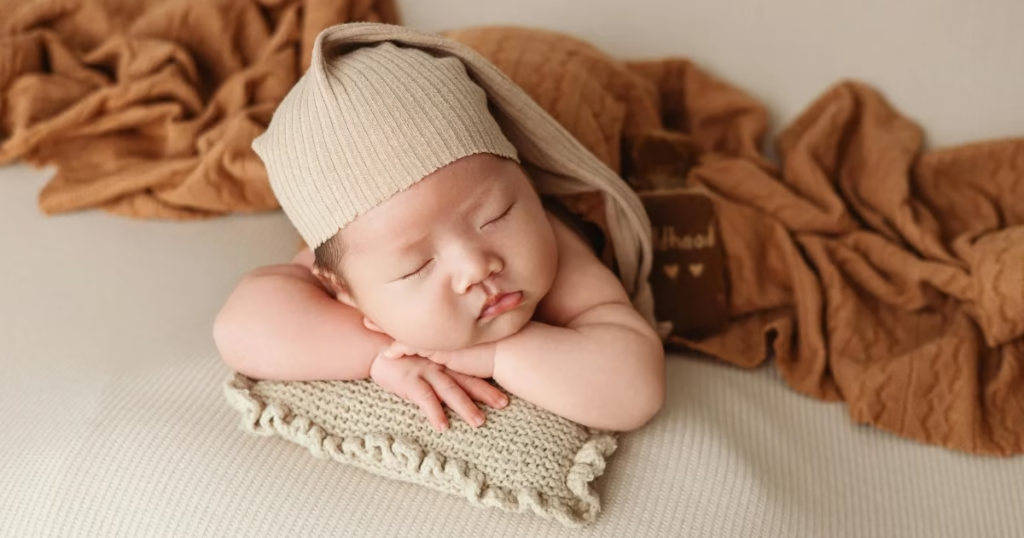
What’s Going On in a Newborn’s Sleep?
Before we tackle newborns’ bad dreams, let’s talk about how newborn sleep works. Babies aren’t like us adults—they’ve got their own sleep vibe, and it’s fascinating. Newborns (0–3 months) sleep a lot, about 14–17 hours daily. But their sleep comes in short bursts since they’re always hungry! Their sleep schedules have more light cycles and more REM (rapid eye movement) sleep than adults do. This stage can also bring odd things, like Hand night terrors or sudden jerky movements. These are usually harmless.
Here’s the deal with newborn sleep:
- Sleep Cycles: Newborns have shorter sleep cycles (about 50–60 minutes) compared to adults (90 minutes). They flip between active sleep (like REM sleep) and quiet sleep.
- Active Sleep: This is where the magic happens—babies twitch, make faces, or even whimper. It’s when their brains are busy processing the world.
- Quiet Sleep: Deeper, calmer sleep where they’re super still and recharging.
- Frequent Wake-Ups: Babies wake every 2–4 hours to feed, so their sleep is all over the place.
So, when you’re wondering newborns having bad dreams, those little movements or cries in active sleep might be what’s catching your eye. But are they actually dreaming? Let’s dig deeper.
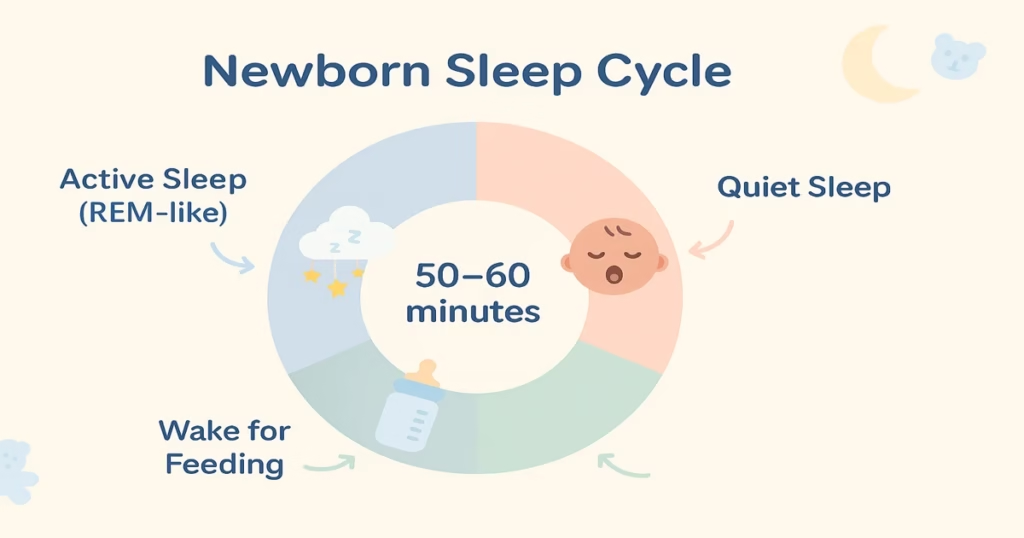
What Science Says:
Here’s the big question: can newborns have bad dreams? The short answer? Probably not, at least not the way we think of dreams. Scientists and pediatricians, like those cited in 2023 studies from the American Academy of Pediatrics, say newborns don’t have the brain wiring for complex dreams yet. Nightmares occur later in childhood, once brain development advances. In fact, experts believe babies start having nightmares only after the first year, when imagination and memory become stronger. Here’s why:
- Brain Development: A newborn’s brain grows quickly. The cortex, which manages imagination and memory, is developing rapidly. Vivid dreams, like nightmares, require a more developed brain.
- No Life Experience: Bad dreams often come from processing emotions or events (like a scary movie). Newborns haven’t had enough life to fuel those kinds of dreams.
- REM Sleep Similarity: Newborns spend around 50% of their sleep in active (REM-like) sleep. In contrast, adults only spend 20% in this stage. Adults dream during this time, but for babies, it’s mainly about brain growth, not stories.
So, can newborns have bad dreams? Experts think no. They might have basic sensory experiences, like flashes of light or sound. However, full-blown nightmares with plots or emotions are unlikely. Those fussy sleep moments are probably just their bodies doing their thing.
Why Do Newborns Fuss or Cry in Their Sleep?
If can newborns have bad dreams isn’t the answer, why do they make those heart-tugging noises or movements? There are a bunch of reasons, and none of them mean your baby’s having a nightmare. Here’s what might be going on:
- Reflexes: Newborns have reflexes like the Moro (startle) reflex, which can make them twitch or flail in sleep.
- Digestive Discomfort: Gas, reflux, or a full diaper can cause fussing, even while they’re out cold.
- Sleep Transitions: Babies may stir or whimper as they move from active to quiet sleep.
- Hunger Cues: A soft cry might signal they’re about to wake up for a feed.
- Overstimulation: Too much noise or light before bed can make them restless.
So, if you’re worried about newborns having bad dreams, don’t stress. Their little bodies are probably just handling normal baby things.
When Do Babies Start Dreaming?
Okay, so can newborns have bad dreams might be a no-go, but when do dreams kick in? Babies’ brains begin to develop the capacity for dreaming as they get older. Here’s a rough timeline:
- 0–3 Months: No complex dreams; active sleep is for brain development, not nightmares.
- 3–6 Months: Babies might start having simple dreams as their memory and emotions develop.
- 12–18 Months: Toddlers can have bright dreams and nightmares. They use dreams to make sense of their daily experiences.
- 2+ Years: Kids start having more detailed dreams, sometimes recalling them (like “a monster chased me!”).
By ages 2 to 3, bad dreams are more common. However, newborns are less likely to have bad dreams because their brains are still developing.
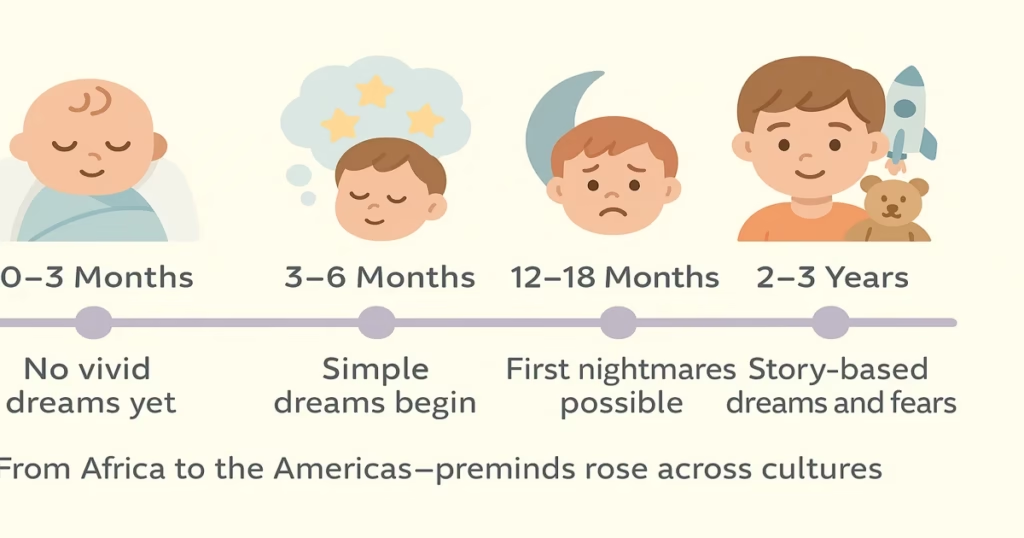
Signs Your Newborn Isn’t Having Bad Dreams
Those little grunts or cries can freak you out, but here are signs your baby’s sleep behavior is totally normal:
- Brief Fussing: Short whimpers or twitches during active sleep that stop on their own.
- No Distress After Waking: If they wake up calm or just hungry, it’s not a nightmare.
- Regular Sleep Patterns: Sleeping 14–17 hours in short bursts is standard for newborns.
- Healthy Behavior: Feeding, growing, and hitting milestones? They’re probably fine.
If you’re still worried about can newborns have bad dreams, these cues suggest it’s just their sleep cycle, not a scary dream.
How to Create a Peaceful Sleep Environment
Even if can newborns have bad dreams isn’t a thing, you want your baby sleeping soundly. A calm sleep setup can reduce fussing and help them (and you!) rest better. Nightmares and night terrors can worry parents as babies grow. This is especially true if a baby wakes up crying at night. A calming environment helps you get better REM rapid eye movement sleep. This sleep is important for growth and brain development. Here’s how to set the stage:
- Keep It Dark: Use blackout curtains to block light, signaling it’s sleep time.
- White Noise: A gentle hum (like a fan or white noise machine) mimics womb sounds.
- Cozy Swaddle: Swaddling reduces the startle reflex and keeps your baby snug.
- Safe Sleep Space: Follow AAP guidelines—baby on their back in a crib or bassinet with no loose bedding.
- Consistent Routine: A simple bedtime routine (like a feed and lullaby) sets a soothing vibe.
- Cool Room: Keep the room at 68–72°F for comfort.
These tricks can minimize those fussy moments that make you wonder can newborns have bad dreams.
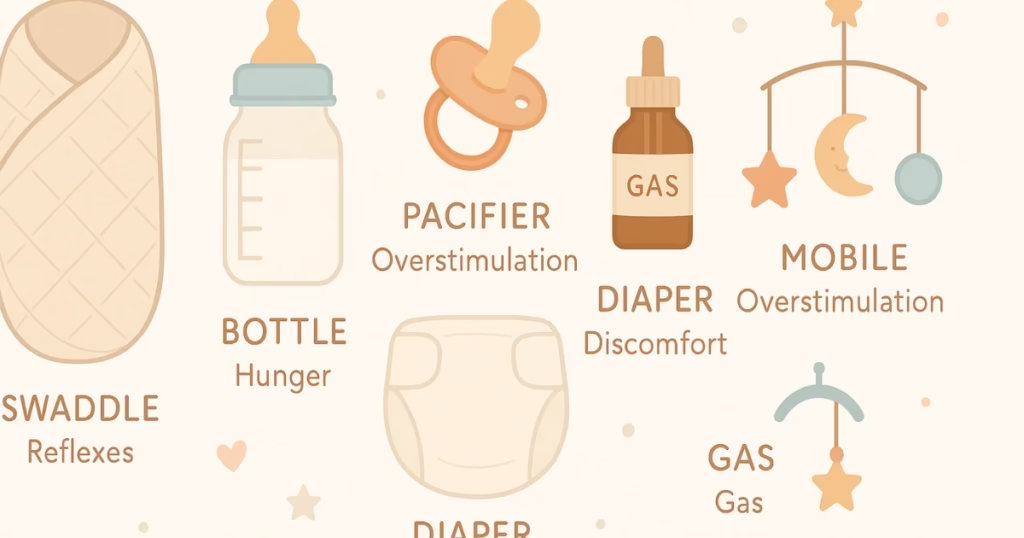
What to Do If Your Newborn Seems Upset in Sleep
Your baby’s cries or twitches can sometimes worry you. If you’re asking can newborns have bad dreams because they seem distressed, here’s how to respond:
- Observe First: Wait a minute—many babies settle back to sleep on their own.
- Check Basics: Is their diaper wet? Are they hungry or too warm?
- Gentle Soothing: Give a soft pat or shush them gently. Don’t pick them up, so their sleep stays undisturbed.
- Feed If Needed: If they’re due for a feed, a quick nursing session might calm them.
- Track Patterns: If fussing happens a lot, note the time and context to discuss with your pediatrician.
Most of the time, these behaviors are normal, but persistent crying or unusual patterns might need a doctor’s input.
When to Talk to a Pediatrician
Newborns usually don’t have bad dreams, but some sleep behaviors might mean more. Reach out to your pediatrician if:
- Crying Is Intense: It’s loud and goes on for a long time. It doesn’t stop even when you try to soothe.
- Sleep Is Disrupted: They’re not sleeping enough (less than 12 hours a day) or seem overtired.
- Other Symptoms: Fever, poor feeding, or lethargy could point to illness or reflux.
- Developmental Worries: If they’re not hitting milestones (like smiling by 2 months), mention it.
Your doctor can check for problems like reflux or colic. These can look like “bad dream” behavior.
Common Myths About Newborn Sleep and Dreams
Newborns often cause confusion. Let’s clarify if they can have bad dreams:
- Myth: Newborns cry in sleep because of nightmares. Truth: It’s usually reflexes, gas, or sleep transitions, not dreams.
- Myth: Babies don’t dream at all. Truth: They might have basic sensory dreams, but not complex ones.
- Myth: Fussing means they are in distress. Truth: Most sleep noises are normal and don’t mean discomfort.
- Myth: You should wake a fussy baby. Let them self-soothe. If they show clear signs of being upset or need feeding, help them.
Knowing these myths helps you relax when pondering whether newborns can have bad dreams.
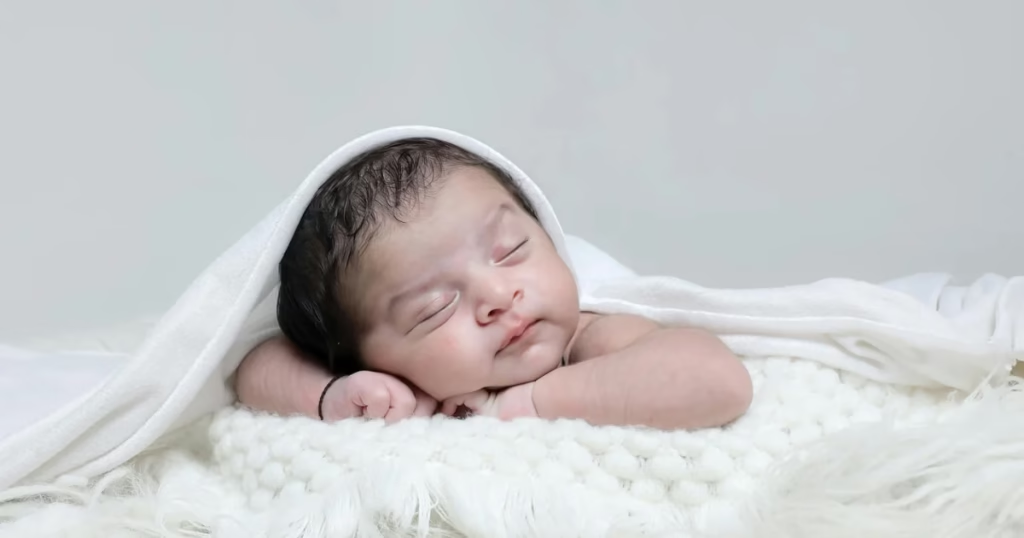
Tips for New Parents: Supporting Your Baby’s Sleep
Being a new parent is wild. Worrying about whether newborns can have bad dreams is just one part of it. Here are some extra tips to keep your baby (and you) happy:
- Learn Their Cues: Watch for sleepy signs, like yawning or rubbing eyes, to time naps.
- Limit Stimulation: Avoid bright screens or loud noises before bedtime.
- Bond Through Routine: A steady bedtime routine helps build trust and calm.
- Take Care of You: Sleep when baby sleeps to avoid burnout—easier said than done, I know!
- Connect with Others: Join parenting groups on X or forums to share tips and worries.
These habits help your baby sleep better. They also cut down on moments that make you wonder if newborns can have bad dreams.
Fun Facts About Newborn Sleep
Here are some fun facts about newborn sleep. Don’t worry too much about why newborns might have bad dreams.
- Sleep Champs: Newborns spend up to 70% of their day sleeping, more than any other age group.
- Brain Boost: Active sleep helps babies build brain connections, say studies from 2023.
- Smile Reflex: Those cute sleep smiles? They’re reflexes, not dreams, but so adorable!
- Womb Vibes: White noise works because it mimics the whooshing sounds of the womb.
Why This Matters for Parents in 2025
In 2025, parenting is all about informed choices. Smart tech like AI baby monitors (Nanit or Owlet) and X posts offer real-time parenting tips. These tools help you understand your baby’s sleep better. Newborns are unlikely to have bad dreams. This lets you focus on what matters—making a safe, cozy space and catching those precious Zs when you can.
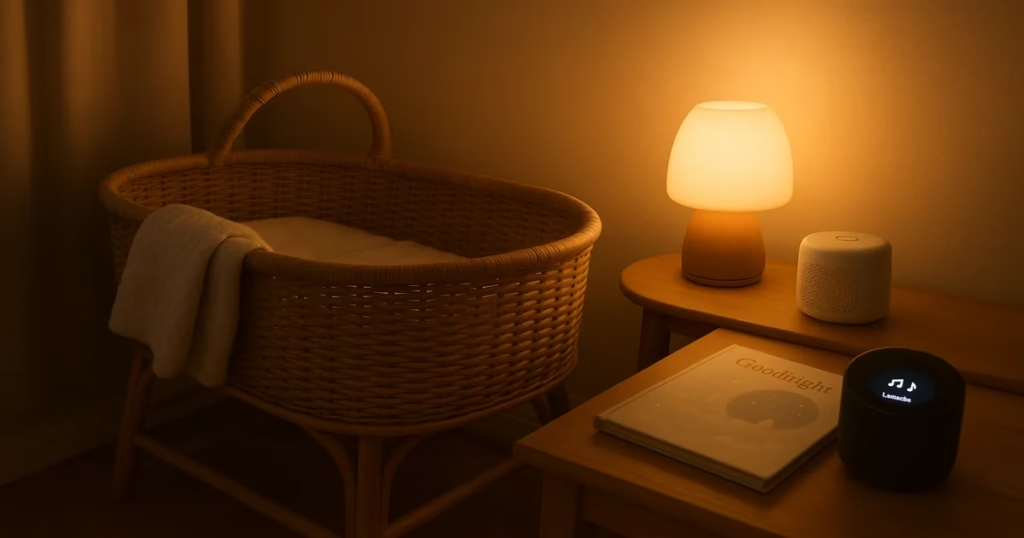
Final Thoughts: Sweet Dreams for Your Newborn
So, can newborns have bad dreams? Probably not—their brains are too busy growing to cook up nightmares. Twitches, cries, or fusses are often just reflexes, digestion, or sleep cycles at work. Make a calm sleep space. Watch for cues. Talk to your pediatrician if needed. This way, you can help your baby sleep soundly. In 2025, with all the parenting tech and community support out there, you’ve got this!
Do you have a funny baby sleep story? Or are you still worried about nighttime fusses? Drop a comment—I’d love to hear from you! If you want easier sleep time, try swaddling and white noise tonight. Happy parenting!


